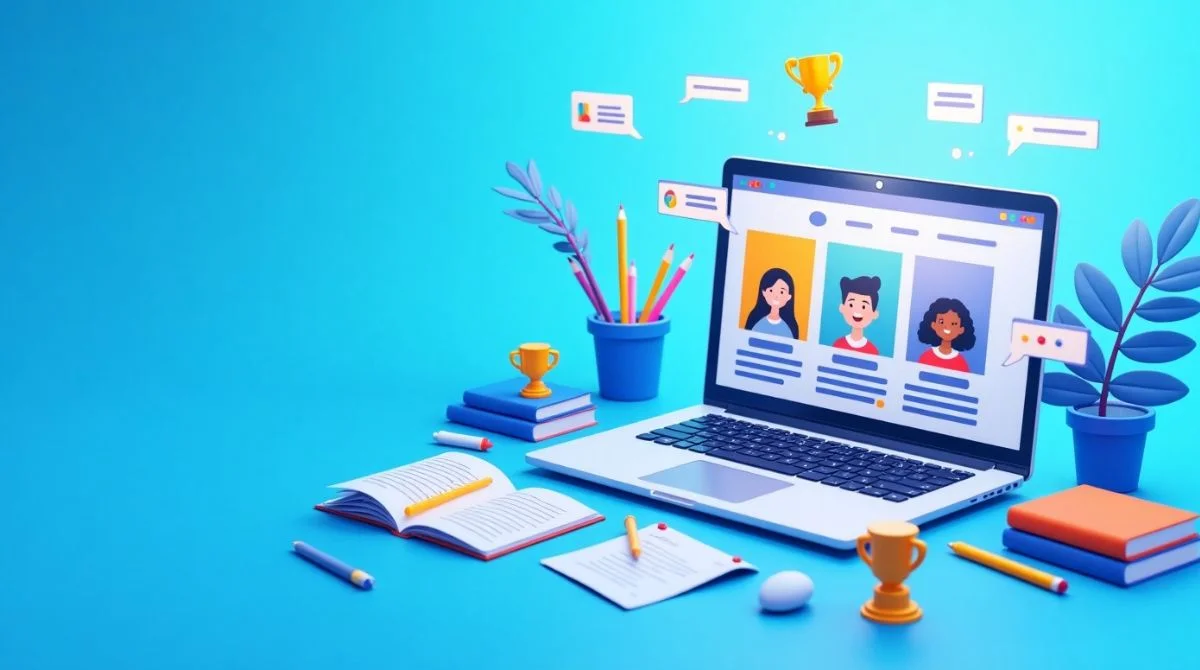Table of Contents
Online learning has changed how people gain knowledge and improve skills. Whether you’re a student, teacher, working professional, or just curious, online learning platforms give you the chance to study from anywhere, at your own pace. These platforms make education more flexible, affordable, and accessible to people around the world. In this article, we’ll explore what makes these platforms special, what types are available, and how you can choose the right one for your needs.
What Are Online Learning Platforms?
Online learning platforms are websites or apps that offer educational content and tools to help users learn new things. These platforms provide courses, video lessons, quizzes, assignments, certificates, and sometimes even degrees. Some are free to use, while others charge a fee. Most platforms let you learn at your own pace, which is perfect for people with busy schedules.
These platforms cover a wide range of subjects including:
- Math and Science
- Computer Programming
- Business and Marketing
- Art and Music
- Personal Development
- History and Social Studies
Whether you’re in school, college, or already working, you can find something useful to learn online.
Key Features of Comprehensive Learning Platforms
Here are some features that make a learning platform “comprehensive”:
- Wide Course Selection: Courses are available in many subjects and languages.
- Expert Instructors: Courses are often taught by university professors or industry professionals.
- Flexible Learning: You can study whenever and wherever you want.
- Interactive Tools: Quizzes, discussion boards, and assignments help reinforce what you’ve learned.
- Certification: Many platforms offer certificates upon course completion.
- Affordable Options: Some platforms offer free access or financial aid.
Benefits of Using Online Learning Platforms
The rise of online education has made learning more democratic and less limited by time or location.
Here’s why they’re so beneficial:
- Accessibility: People in remote areas can access high-quality education.
- Self-paced Learning: Users can go at their own speed without pressure.
- Updated Content: Information is kept current, unlike old textbooks.
- Engagement: Videos, animations, and quizzes make learning fun.
- Cost-effective: No need to buy expensive books or travel.
Popular Online Learning Platforms
Let’s take a look at some of the most well-known platforms that are used around the world.
1. Khan Academy
Khan Academy is a nonprofit platform offering free courses for students of all ages. It covers math, science, economics, arts, and even test preparation for SATs. The lessons come in the form of short video clips with simple explanations. There are practice questions, quizzes, and helpful dashboards for teachers and parents to track progress.
2. Coursera
Coursera partners with top universities and organizations to offer online courses and degrees. Many courses are free to audit, and you can pay for certificates. Subjects range from computer science to public health. It’s perfect for college students or working professionals looking to upgrade their skills.
3. e d X
Similar to Coursera, e d X provides university-level courses from institutions like Harvard and MIT. Courses are available for free, and students can pay for a verified certificate. The platform offers both short-term courses and full online degree programs.
4. Udemy
Udemy is a marketplace where experts can create and sell their own courses. It offers over 150,000 courses in topics like business, marketing, design, and programming. Courses are often on sale, and once purchased, you have lifetime access.
5. LinkedIn Learning
Previously known as Lynda.com, LinkedIn Learning offers video-based courses in business, tech, and creative skills. You get certificates of completion that are added to your LinkedIn profile, making it a good choice for job seekers.
6. Future Learn
Future Learn is a UK-based platform offering short courses and full degrees in areas like healthcare, business, and teaching. It partners with leading universities and includes discussion forums, quizzes, and peer-reviewed assignments.
7. Skill share
Skill share focuses on creative topics like photography, writing, and graphic design. It’s a good platform for people looking to build or expand a creative career. You need a subscription to access most of the content.
8. MIT Open Course Ware
MIT offers many of its real classroom materials for free through its Open Course Ware platform. This includes lecture notes, assignments, and exams. It’s great for learners who want a deep dive into subjects like engineering and computer science.
9. Open Learn by The Open University
This platform offers thousands of free courses from beginner to advanced level. It also includes articles, quizzes, and videos in subjects like health, money, and education.
How to Choose the Right Platform?
With so many platforms available, it’s important to choose the one that best fits your needs. Here are some factors to consider:
- Your Goals: Are you learning for fun, for work, or for school?
- Course Content: Make sure the platform covers your topic.
- Teaching Style: Some platforms are more video-based; others may be text-heavy.
- Budget: Decide if you want to pay or stick with free options.
- Time: Pick a course that matches your schedule.
Tips for Success in Online Learning
Online learning requires self-discipline and good planning. Here are a few tips to help you succeed:
- Set a Schedule: Treat your course like a real class.
- Find a Quiet Space: A distraction-free environment helps you focus.
- Take Notes: Writing things down helps with memory.
- Participate in Forums: Ask questions and interact with other learners.
- Review Often: Revisit lessons and quizzes regularly.
The Future of Online Learning
As technology improves, online education will only get better. New tools like virtual reality (VR) and artificial intelligence (AI) are being added to platforms to make learning more immersive and personal. More schools and universities are offering hybrid programs that mix online and classroom learning. This means students will have more choices and flexibility in how they learn.
Employers are also starting to value online certificates and courses, especially when they come from respected institutions. As lifelong learning becomes the norm, these platforms will play a key role in career development.
Conclusion
Comprehensive online learning platforms have made it easier than ever to learn something new. They offer flexible, affordable, and high-quality education to people all over the world. Whether you want to pass a school test, change your career, or explore a hobby, there’s an online course out there for you. With the right platform, strong motivation, and a clear goal, you can turn your free time into productive learning time.
Also Read this: Experiential Learning and Career Readiness






